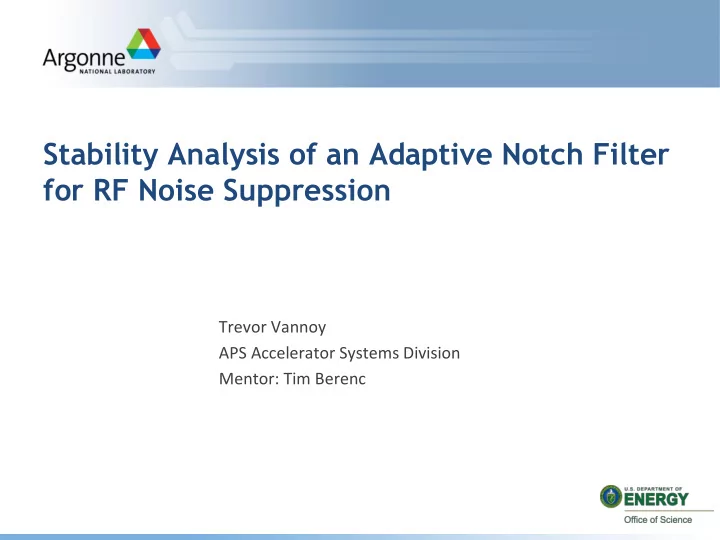

Stability Analysis of an Adaptive Notch Filter for RF Noise Suppression Trevor Vannoy APS Accelerator Systems Division Mentor: Tim Berenc
Background 360 Hz 120 Hz 60 Hz 2 Reduced by ~ 30 dB Advanced Photon Source, Argonne National Laboratory
Adaptive Noise Canceller Advanced Photon Source, Argonne National Laboratory 3
Adaptive Noise Canceller Advanced Photon Source, Argonne National Laboratory 4
Closed Loop Transfer Function Open-Loop transfer function Closed-Loop transfer function • Stability of the closed-loop system is determined from its poles • Its poles are the zeros of 1 + G(s) Advanced Photon Source, Argonne National Laboratory 5
Argument Principle Advanced Photon Source, Argonne National Laboratory 6
Nyquist Example ϒ Γ • Can handle poles on the contour by integrating around them Advanced Photon Source, Argonne National Laboratory 7
Adaptive Notch Filter G(z) Advanced Photon Source, Argonne National Laboratory 8
Adaptive Notch Filter Actual Implementation Gains LPF BPF G(z) Advanced Photon Source, Argonne National Laboratory 9
Labview Code Advanced Photon Source, Argonne National Laboratory 10
Lab Setup Advanced Photon Source, Argonne National Laboratory 11
Results Non-ideal Hilbert filter Improved Hilbert filter magnitude phase Nyquist Advanced Photon Source, Argonne National Laboratory 12
Results Higher gain Adding 3 samples of group delay to theoretical model magnitude phase Advanced Photon Source, Argonne National Laboratory 13
Future Work Determine where additional group delay is coming from Determine where -1.2 dB gain difference is coming from Improve Hilbert filter for other frequency channels – Add multiplier to fix scaling – Redesign Hilbert filter Model 120 Hz and 360 Hz channels – Change parameters in Mathematica code Include existing RF feedback loops in analysis Advanced Photon Source, Argonne National Laboratory 14
Recommend
More recommend